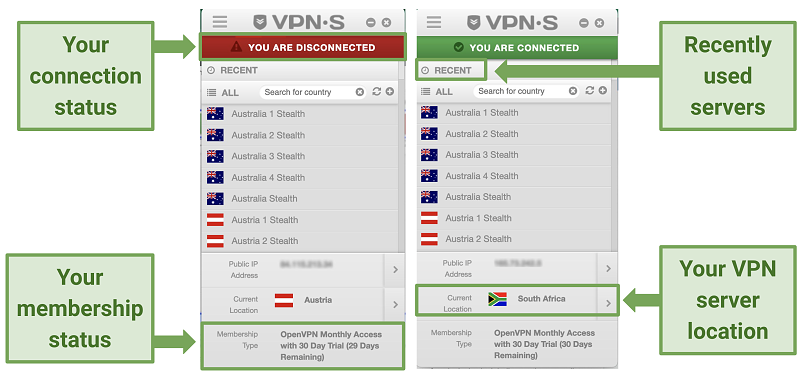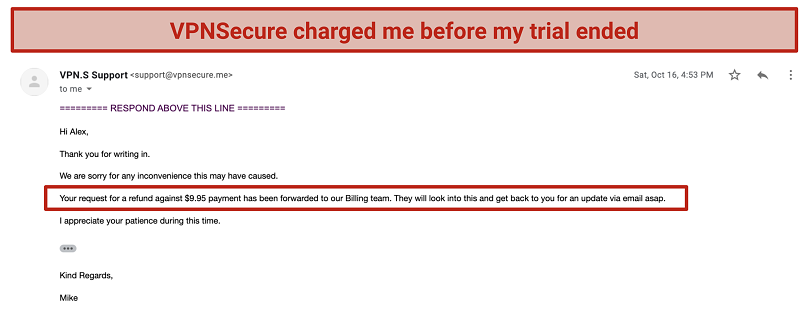Important. VPNSecure is now owned by InfiniteQuant Ltd. This acquisition cancels VPNSecure lifetime subscriptions effective 28 April 2025.
VPNSecure looks good on paper, but does it deliver? Finding a VPN that performs well in all fields isn’t an easy task.
We took it for a test run to see whether this provider can keep you as secure as its name implies.
Founded back in 2010 in Sydney, NSW, VPN Secure offers solid security features with a seemingly airtight no-log policy.
According to its customer support, it should even work in China. However, it falls under the Australian jurisdiction, a member of the 5 Eyes Alliance, so I’m not sure if its “No Logging, ever!” slogan lives up to its claims.
With servers spanning across a little more than 40 countries, it’s not a surprise we couldn’t get it to work with most of the streaming sites we tried. But as confirmed by its support, streaming isn’t its primary focus in the first place.
It accepts many payment options and platforms, but instead of a free trial, it offers a short 7-day trial for which you need to pay $1.
Try VPNSecure Today!
Short on Time? Here Are My Key Findings
VPNSecure Features — 2025 Update
6.8
|
💸
Price
|
2.99 USD/month
|
|
📆
Money Back Guarantee
|
30 Days |
|
📝
Does VPN keep logs?
|
No |
|
🖥
Number of servers
|
58+ |
|
💻
Number of devices per license
|
5 |
|
🛡
Kill switch
|
Yes |
|
🗺
Based in country
|
United Arab Emirates |
|
🛠
Support
|
Email support |
|
📥
Supports torrenting
|
Yes |
Streaming — Not the Best Choice
3.6
Our tests showed that VPNSecure doesn't work with most streaming services. Its service primarily revolves around security and privacy rather than streaming. So, if you’re looking for a VPN that’ll let you stream securely in HD from anywhere, you might want to look elsewhere.
We couldn’t watch Amazon Prime Video, Hulu, ESPN, Max, or ITVX. The only sites it worked with were Disney+ and Peacock. As confirmed by its support, "While it can be used for that, it's an uphill battle."
However, we appreciated that customer support was refreshingly honest about the issue. The agent even said the company was thinking about partnering up with another company to make up for the features VPNSecure lacks while focusing on doing what it does best — keeping you safe.
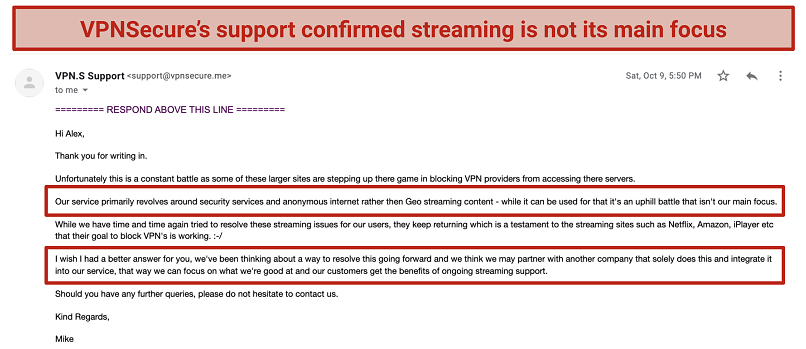 VPNSecure’s customer representative told us streaming has been a constant battle
VPNSecure’s customer representative told us streaming has been a constant battle
VPNSecure also offers an HTTP Proxy, which you can't use on the same system with a VPN. The HTTP Proxy feature lets you stream with potentially faster speeds than if you connected to a VPN server. However, HTTP Proxy does not have encryption, which leaves you vulnerable.
Be advised. We only recommend no-logs VPNs that cannot see or track what you do online. Therefore, it’s up to you to use a VPN responsibly and in compliance with the law and any other applicable regulations. The vpnMentor team does not condone copyright infringement.
Works With: Disney+ and Peacock
We were pleasantly surprised that we could watch The Mandalorian without buffering on Disney+ using VPNSecure. However, Ultra HD and HD weren't supported.
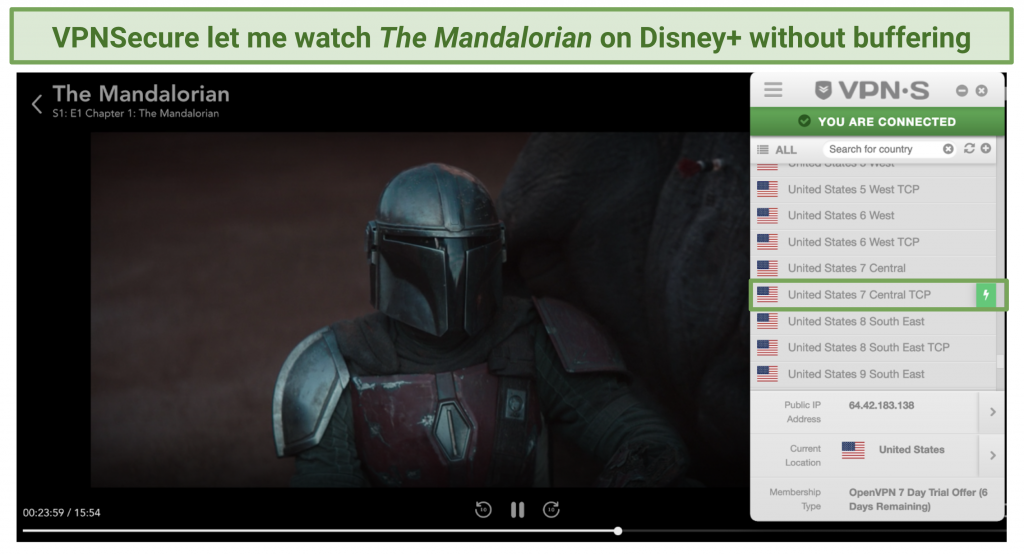 The US 7 Central server proved to be reliable
The US 7 Central server proved to be reliable
Peacock also worked on every US server. We had no issues watching The Office securely and without lag.
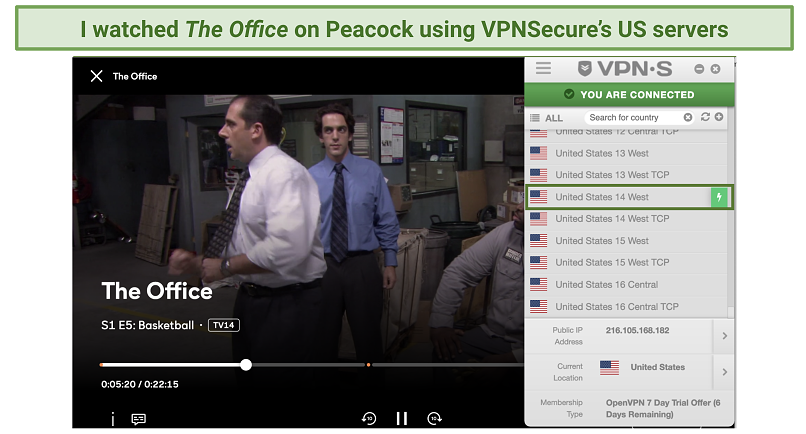 When VPNSecure works with a platform, it works really well
When VPNSecure works with a platform, it works really well
Doesn’t Work With: Amazon Prime Video, Hulu, ESPN, Max, BBC iPlayer, and iTV
All the other streaming platforms we tested detect and block VPNSecure.
We had no luck with any of the Netflix libraries we tried. Our tests included libraries for the US, Canada, Mexico, and the Netherlands, and we saw the proxy error every time.
We also couldn’t watch BBC iPlayer when we tried its United Kingdom 1 server. If you want to stream UK TV privately using a VPN, I suggest you skip right away to finding the VPNs that actually work with BBC iPlayer.
This was a consistent issue with VPNSecure. It also didn’t work with Hulu, Amazon Prime Video, ITVX, or Max on any of the servers we tried. We either saw a blank screen or a proxy detection error.
Speeds — Cut In Half
4.6
In our experience, VPNSecure reduces your speeds by about half. Depending on your baseline connection, it can still be good enough for browsing and even less demanding gaming.
We started with a baseline speed of around 70 Mbps download and 45 Mbps upload. Specific remote servers performed surprisingly better than we expected, such as the server in Hong Kong. In contrast, servers in Germany and the Netherlands (two locations that are usually pretty speedy) were slower.
| Server |
Ping (ms) |
Download (Mbps) |
Upload (Mbps) (ms) |
| Baseline Internet |
11 |
68.50 |
46.20 |
| United States TV + Streaming |
167 |
31.59 |
6.78 |
| United Kingdom 1 |
51 |
38.07 |
16.95 |
| Mexico |
318 |
16.20 |
2.67 |
| United Kingdom 1 |
49 |
42.79 |
38.80 |
| Hong Kong 1 |
221 |
61.29 |
20.70 |
| Germany 1 |
59 |
55.95 |
36.98 |
| Japan 2 |
469 |
18.90 |
21.01 |
| Australia + Ad Blocker |
605 |
5.58 |
6.82 |
| Singapore 1 |
355 |
57.60 |
13.93 |
| Netherlands 1 TCP |
47 |
10.31 |
4.70 |
| VPNSecure average |
234.1 |
33.82 |
16.93 |
| Average slowdown |
+223.1 |
50.62% |
63.35% |
Overall, we had an average slowdown of 50%. If you could use this VPN for streaming, this reduction would put it in the unreliable category. A 50% drop is still usable for basic browsing and less demanding gaming, but personally, I wouldn’t use it for fast-paced games.
Are VPNSecure’s Speeds Fast Enough for Gaming? Yes
I was able to play some low-bandwidth online games on Steam on my MacBook Pro using OpenVPN over standard UDP protocol. I must say there were a few hiccups here and there as I was downloading Steam and the game itself, but later the gameplay went smoothly.
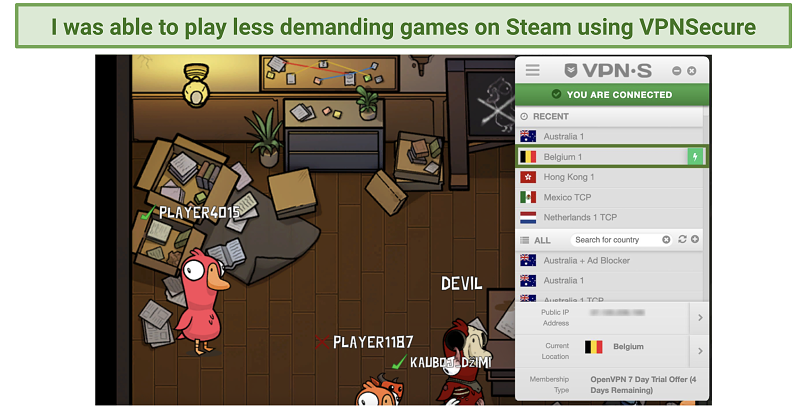 I was able to play online games on Steam using VPNSecure's Belgium server
I was able to play online games on Steam using VPNSecure's Belgium server
VPN Secure doesn't provide custom apps for streaming or game consoles, though. If you want a VPN for gaming, especially in HD, you would need some faster and more robust VPNs.
Server Network — Decent
5.0
I wasn’t too impressed with its server coverage, as VPNSecure has only 58 servers, but they are well-spread across 40 countries.
That number is low compared to some top-tier VPNs with hundreds, even thousands of servers. For example, there are only a handful of servers in Africa and South America, located in Brazil, Chile, and South Africa. With most servers in North America and Europe, coverage is passable at best.
Having a smaller server network may affect your connection during peak hours due to congestion, which happened to me a couple of times.
As for its IP addresses, that number remains undisclosed.
However, what I found interesting about its server network is that VPNSecure owns and operates its own network. The benefits of maintaining its own network range from increased privacy and security to better speeds.
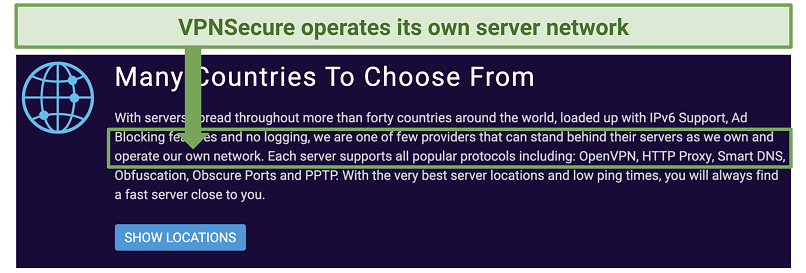 VPNSecure is completely in charge of its server network
VPNSecure is completely in charge of its server network
Server Locations
The exact number of virtual or physical servers is unclear (and is subject to change). But here’s the list of countries with server locations:
| Australia |
Indonesia |
Russia |
| Austria |
Ireland |
Singapore |
| Brazil |
Israel |
South Africa |
| Belgium |
Italy |
Spain |
| Bulgaria |
Japan |
Sweden |
| Canada |
Mexico |
Switzerland |
| Denmark |
Netherlands |
Ukraine |
| France |
New Zealand |
United Arab Emirates |
| Germany |
Norway |
United Kingdom |
| Hungary |
Poland |
United States |
| India |
Romania |
Hong Kong |
VPNSecure's app does not label the cities where the servers are. You have to cross-reference the cities with information on its server location page.
Security — Full Range of Security Features
7.0
As far as security goes, I’d say VPNSecure comes with the full package, both encryption- and protocol-wise.
Ranging from a cipher strength of 64-bit, which provides less protection but better speeds, to Advanced Encryption Standard (AES) 256-bit — which is the level government websites use. Hackers often use methods such as brute force attacks or even a dictionary attack that goes through the alphabet (e.g., "AA", "AB", etc.) to guess passwords. Neither of these attacks can overcome 256-bit encryption. By default, 128-bit encryption is selected.
It supports all popular security features and protocols, including:
- OpenVPN — one of the safest and most commonly used protocols today
- HTTP Proxy — primarily used for effectively masking IP addresses
- Smart DNS — used primarily for accessing geo-restricted content
- PPTP — an older but faster protocol
- IPv6 — the most recent internet protocol whose main benefit is that it can create original TCP/IP address identifiers, which increases privacy and security
It also has an IPv6 kill switch that automatically disconnects your device from the internet in case your VPN connection breaks to prevent traffic leaks. You can turn on the kill switch manually in the Advanced Settings menu.
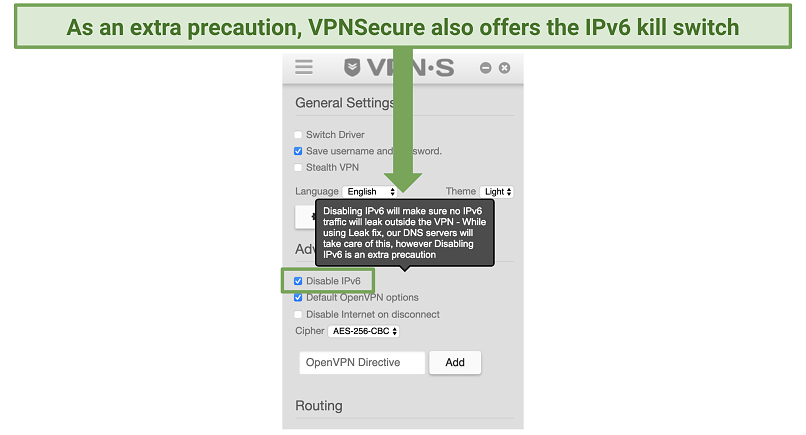 You can turn on the “Disable IPv6” feature as an extra safety measure against traffic leaks
You can turn on the “Disable IPv6” feature as an extra safety measure against traffic leaks
Testing for Leaks and Malware
I tested VPNSecure for DNS and WebRTC leaks and malware, on my Android, Windows, and Apple devices. All tests came back free of any leaks and viruses. Just quick info in case you were wondering:
- DNS leaks can allow your ISP to see the sites you visit despite using the VPN
- WebRTC leaks can reveal your real IP address even though you're using a VPN
- Malware refers to any type of malicious software, viruses being one of them
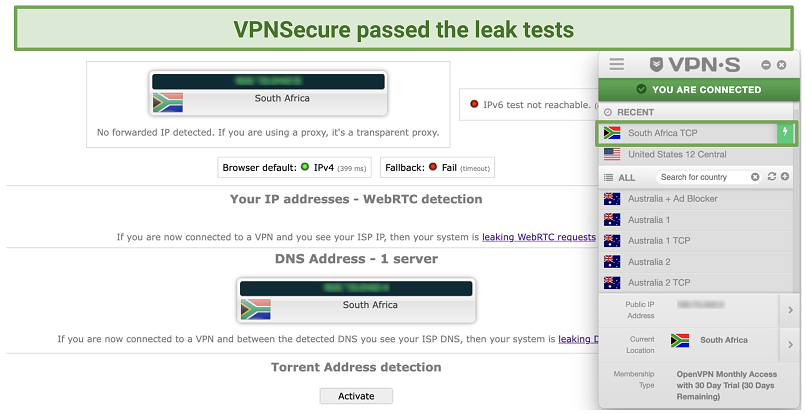 No leaks were detected using VPNSecure
No leaks were detected using VPNSecure
According to VPNSecure, you don't have to worry about "leak fixes" or disabling IPv6 because VPNSecure supports it natively with dual-stack IPv4 & IPv6 VPN support. The company says that dual-stack protects your privacy on every device and network.
Additionally, I performed a VirusTotal scan on the application that showed it was free of viruses and malware.
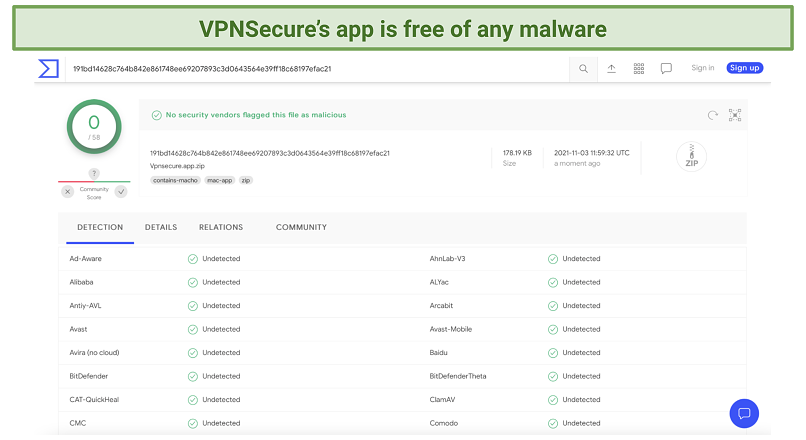 You can safely install VPNSecure’s app
You can safely install VPNSecure’s app
Privacy — Tight, but Not Exactly as Advertised
7.2
VPNSecure logs as little information as technically possible in a 5 Eyes country and uses a “shared static IP service” feature to protect user information.
Australia, the US, the UK, Canada, and New Zealand have an agreement to share information whenever there are some common interests. In addition to that, Australia’s anti-encryption law passed in 2019 allows the government to force businesses to hand over user information even though it’s encrypted, which is a big blow to privacy.
However, it seems like VPNSecure has found a way around this. The trick lies in its “shared static IP service” feature. I contacted customer support to ask what happens to its “No Logging, ever” policy if they are obliged to share information. Its customer representative replied that VPNSecure uses a “shared static IP service,” meaning many users simultaneously use the same IP address.
This IP distribution system protects users as having the same IP address keeps you private because “all traffic is mixed among all users,” making it difficult to discern which is which.
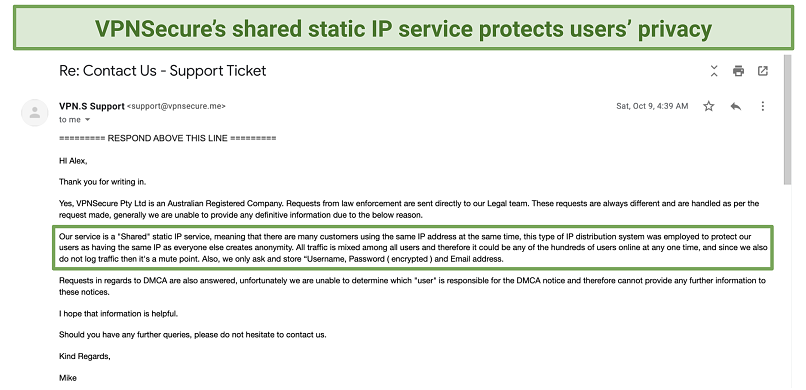 Each time you connect to a specific server, you get a shared IP address
Each time you connect to a specific server, you get a shared IP address
In my opinion, if you're looking for a privacy-focused VPN, a shared static IP address isn't always a good solution. It might work in some cases, but static IP addresses are more hackable than dedicated IP addresses.
VPNSecure keeps your username, email address, and password. To put your mind at ease, it encrypts the password with 256-bit encryption, which is practically unbreakable. The company does not log your IP address, connection and disconnect timestamps, bandwidth usage, or DNS requests.
It would also be nice if it supported Tor, which would add an extra layer of privacy to your online activities.
The company also provides a Chrome proxy browser extension. However, unlike a full VPN, the extension only masks your IP address, but it doesn't encrypt your web content.
What I particularly liked about VPNSecure is using its AdBlocker servers for an ad-free surfing experience. Not all servers have an in-built AdBlocker, though.
Torrenting — Possible but Risky
5.8
You can use VPNSecure for P2P, but I wouldn't recommend it for regular torrenting.
As confirmed by its support, torrenting is allowed. 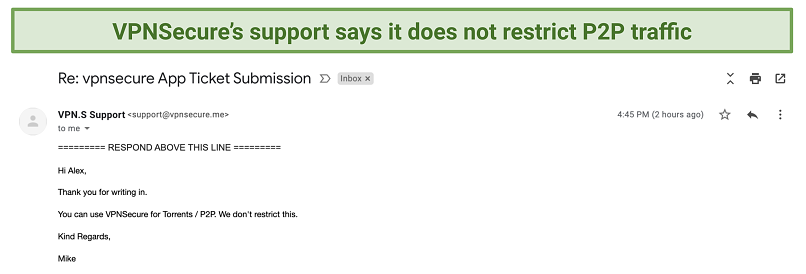
Still, I don't think VPNSecure is the best choice for P2P for 3 reasons.
Firstly, because of its location in a 5 Eyes country, which means your activities are never completely private. Australia’s invasive anti-encryption law means government agencies can ask for user info even if it is protected by encryption.
Secondly, its speeds are not optimal, so depending on what you're torrenting, it might take a while. Lastly, it doesn't have dedicated servers that some other P2P-friendly VPNs have, which are always more reliable and faster.
On the bright side, it does have a special feature similar to split tunneling. The feature (called "Routing") allows you to add the domains you want to route through the VPN only, which is useful for staying safe while torrenting. Also, VPNSecure enables SSH Socks proxies for applications, including P2P, which makes your connection even more secure.
However, my team and I don’t condone illegal torrenting, so be sure to check the rules and regulations in your country.
Does VPNSecure Work in China? Yes
According to its customer support, SecureVPN should work in China thanks to its Stealth VPN feature.
The support team also claims that it does work in China if you use the Stealth mode:
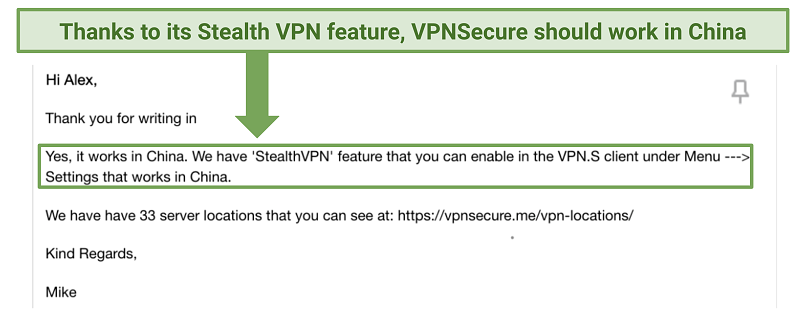 VPNSecure’s customer support confirmed the VPN should work even in China if you use its Stealth VPN feature
VPNSecure’s customer support confirmed the VPN should work even in China if you use its Stealth VPN feature
The Stealth mode is what the company calls its obfuscation technology, which offers an improved level of privacy. VPNsecure’s obfuscation tools might be helpful in other internet-censored countries like Turkey and Russia, though.
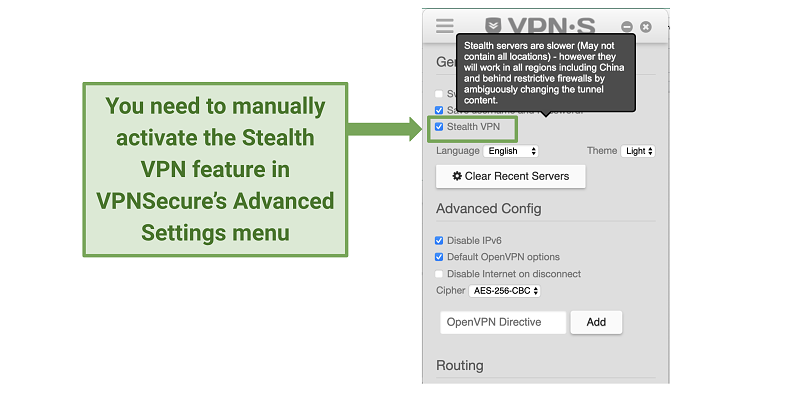 The Stealth VPN feature can help you use SecureVPN even in high-censorship countries like China or Iran
The Stealth VPN feature can help you use SecureVPN even in high-censorship countries like China or Iran
If you decide to use a VPN in China, I recommend using some other VPNs that are proven to work in China. However, I’d be cautious using the VPN in an internet-restricting country like China (which does not allow VPNs), Saudi Arabia, Belarus, and Iran, which also restricts some social media and streaming content.
Simultaneous Device Connections — Works With up to 5 Devices but Using a Different Server for Each
VPNSecure allows you to connect up to 5 devices simultaneously. However, you have to connect each on a different server.
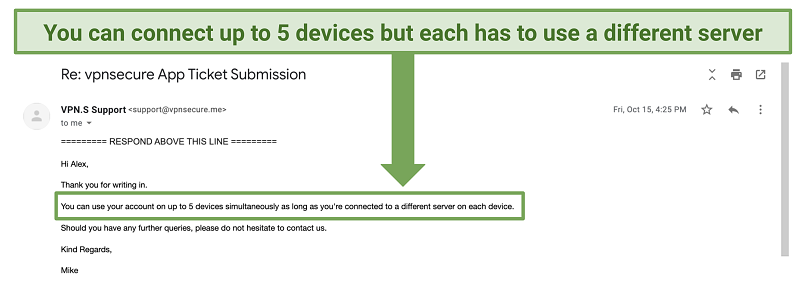 You can connect up to 5 devices at the same time but each device has to be connected to a different server
You can connect up to 5 devices at the same time but each device has to be connected to a different server
We put this to the test by streaming Netflix and YouTube on 4 devices simultaneously. We installed VPNSecure on a MacBook, a desktop PC, an old iPad, and an Android phone. However, we ran into bandwidth issues when we tried streaming videos on all of them at once.
Device Compatibility — Works With All Major OS and Devices
VPNSecure supports almost all OS and devices, including Android, Windows, macOS, iOS, Linux, and routers.
Even though it does not have special support for streaming and gaming devices such as Apple TV, Amazon Fire TV, Chromecast, Nintendo, PlayStation, Roku, and Xbox, you can still protect them by installing the VPN on a router.
The router with a VPN can encrypt your entire internet connection, so you don't need to install a VPN on each device. To make that even more straightforward, VPNSecure partnered up with FlashRouters to provide pre-configured routers with prices ranging from $199 to $349. As found on its website: FlashRouters offers "DD-WRT routers from Airlink, Asus, Cisco Linksys, D-Link, Netgear, TP-Link, and Trendnet, all directly compatible with VPNSecure VPN."














